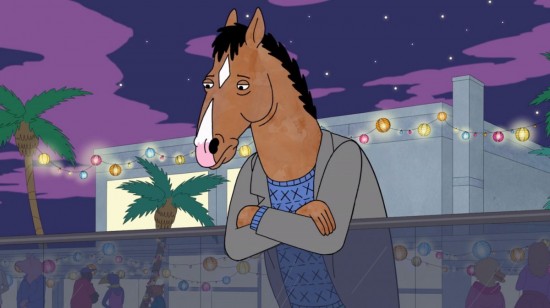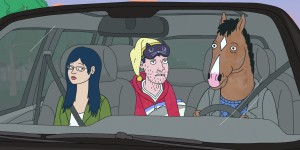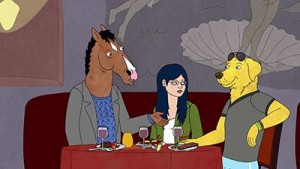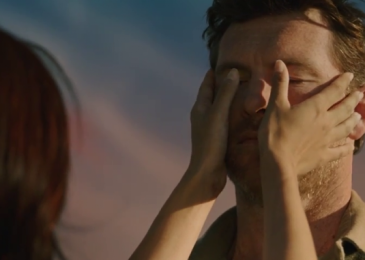The best show on television right now is a cartoon about an alcoholic horse.
Three seasons in, and Netflix’s “BoJack Horseman” is still a hard sell to my friends. Some raise an eyebrow over yet another adult cartoon about characters behaving badly. My friends who are up for some edgy humor raise the other eyebrow when I tell them that the show regularly goes beyond coarse jokes and wonderfully bad puns to a place of contemplative silence and existential angst. But those who give it a shot often walk away impressed and even moved by a cartoon about talking animals, self-destructive celebrities and the elusive search for happiness.
For the uninitiated, BoJack Horseman (voiced by Will Arnett) is an actor whose biggest break was the TGIF-style sitcom “Horsin’ Around.” BoJack’s a horse(man) who lives in a world where humans and animals work and play together. When we meet him in season 1, he’s living a life of meaningless sex and endless substance abuse in the “Hollywoo” Hills (the missing ‘D’ is one of the show’s great long-running gags). He lives with Todd (Aaron Paul), a stoner who started crashing on BoJack’s house and didn’t leave. His days are normally spent bugging his agent, a cat named Princess Carolyn (Amy Sedaris), about roles that can cash in on his fading stardom. The rest of his time is spent reliving his glory days by watching “Horsin’ Around” reruns, getting drunk and sleeping with the few fans who remember him.
I’ll admit that I grew restless during the first half of “BoJack Horseman’s” first season. The first few episodes are funny, but they’re the typical collection of pop culture wisecracks, crude comments and bad puns that you can see on any “Adult Swim” show (although to be fair: “BoJack” wins the bad pun contest hands-down). And then, with episode 7 (“Say Anything), the show quieted down for a look at Princess Carolyn’s frustrations and failed dreams, and followed it up with a gut-punch revelation in the next episode, in which BoJack was forced to confront his actions and their impact on others. From there, the season continued to balance surreal, very funny humor with long, awkward silences as BoJack contemplated his mess of a life, his own internal make-up, and the possible meaninglessness of it all.
Every season has a major thread around which BoJack will try to orient his happiness. In the first, he clings to the hope of writing his memoirs as a way to remind people of his accomplishments. In season two, he lands the lead role in a prestigious biopic. In season three (released on Netflix in July), he chases an Oscar, even as old friends tell him it won’t satisfy his emptiness.
Spoilers for ‘BoJack Horseman’ follow.
But happiness eludes BoJack. Working with his ghostwriter, Diane (Alison Brie), BoJack for the first time sees what he looks like through others’ eyes — and it’s pretty ugly. The season’s most devastating moment comes when he interrupts a panel Diane’s speaking on to ask her if he’s a good person; the silence that ends the episode is deafening. In season two, BoJack sabotages his best chance at a professional comeback by walking off set and pursuing an old flame in Santa Fe — and then, when he finds out she’s married, he screws up that friendship by nearly sleeping with her teenage daughter. In season three, BoJack pins all his hope on awards and fame; it’s probably not a spoiler to say it doesn’t happen, but that disappointment allows the character to spin out to some of the darker and more troubling places the show has gone. BoJack constantly wrestles with the reality that happiness eludes him and that the things he thinks will satisfy aren’t as fulfilling as they initially appear. What’s worse, there seems to be something broken inside of him that pushes people away and runs from happiness. One of season three’s hardest-hitting moments comes when a friend, frustrated from being let down again, tells BoJack that his problem lies beyond his circumstances [explicit language follows]:
“You are all the things that are wrong with you. It’s not the alcohol, or the drugs, or any of the shitty things that happened to you in your career or when you were a kid. F***, man. What else is there to say?”
But BoJack’s not the only person doing soul searching throughout the series. Diane wrestles with her waning passion for social issues and the ease with which she seems to have sold out her ideals for a career. Princess Carolyn works hard to succeed as an agent and find love, but finds it’s more difficult and punishing than she anticipated. The only characters who seem legitimately happy are Todd and Mr. Peanutbutter — a golden retriever (voiced by Paul F. Tompkins) who rode BoJack’s coattails — and that’s because they excitedly pursue every weird and bad idea that crosses their path, maybe as a way to distract themselves (Mr. Peanutbutter: “The universe is a cruel, uncaring void. The key to being happy isn’t a search for meaning. It’s just to keep yourself busy with unimportant nonsense and, eventually, you’ll be dead!”). But even Mr. Peanutbutter has moments of introspection and dis-quiet in season 3.
I wouldn’t call “BoJack” a “Christian” show by any means, nor is it an overly moral one. But there is a spiritual search at its core, and there are times where it comes across as an anthropomorphized retelling of Ecclesiastes. It’s about the way sometimes life appears to be futile and how the things we chase for meaning and happiness can vanish quickly and leave us unfulfilled. Were the show a live action drama, it would almost be too painful to bear, not because every episode ends in disaster but because the questions the characters ask cut too closely to the bone. We’re not former celebrities, but we all have things that we’ve leaned on because we thought they would bring us happiness; we’ve all felt the angst and beginning of despair when our dreams weren’t the lifesavers we thought they’d be. Many of us have careers that peaked early, marriages that disappoint or gnawing restlessness that we can’t quite place. Some of us run to addictions or struggle with depression (two big struggles for BoJack). As an animated comedy, the surreal humor and nonstop verbal jabs keep things light and make the emotional punches sting.
“BoJack Horseman” is sometimes uncomfortable, but I feel like I can’t stress enough that it is also one of television’s funniest shows. Arnett has never been better; what starts as an oblivious, douchey character takes on new resonance, pathos and heart. BoJack does unlikable things, but Arnett’s earnestness keeps our sympathies even when the character’s not acting very sympathetic. The animation is often very sharp, the visual and running gags are some of the best on TV, and the show plays with form in some wonderful way (in season three, there’s a nearly silent episode that’s both beautiful and hysterical, and there’s also a “bottle episode” — rare for an animated show, for obvious reasons — that allows Arnett and Sedaris to do some of their best work). The emotion and existential questions make it stick to the ribs in a way that other animated shows don’t (even “Rick and Morty, which I love and which also dabbles in darkness, but lacks genuine heart).
But also keeping it from being depressing are the whispers of redemption and the glimpses of progress. BoJack is a show about depression and addiction, and much of its language is based around self-help programs or recovery groups like Alcoholics Anonymous. BoJack keeps screwing up, but he also keeps pushing forward, even if it’s an inch at a time (and often followed by a half-inch back). BoJack gains a sense of self-awareness in the first season that allows him to see his flaws and the effect they have on others; it’s that awareness that allows him to start taking baby steps forward. At the end of season two, after hitting rock bottom again, the season ends with BoJack going for a jog and worn out at the end. “It gets easier,” a fellow jogger tells him. “Every day it gets a little easier. But you have to do it every day. That’s the hard part.”
And that’s the quiet thread running through “BoJack Horseman.” He’s not an antihero who we want to see get his comeuppance; he’s a flawed (horse)man who we want to see get better. And even though life and his own worst impulses continue to hound him, he does make progress. By season three, he’s more open to his friends and more intentional about treating them fairly. And even when he screws that up and spirals into self-destruction, some sort of outside grace keeps him from going too far, and directs his gaze to a pack of horses running free, in solidarity. I don’t know where BoJack’s journey will ultimately end, but the show gives me enough breadcrumbs of hope that I have a feeling he’ll be okay.
I’ve long believed animated comedies were not just kids’ stuff; it’s the lesson I learned from watching “The Simpsons” obsessively in college. But “BoJack Horseman” goes further than any of those shows. It’s not just clever, funny and scathing — although it’s definitely all of those things. It’s that it’s surreal nature and outlandish premise allows it, oddly enough, to be more honest and human than even a live-action drama would be. “BoJack Horseman” disarms us with humor and wit before confronting us with the questions that keep us awake at night and the fears we don’t speak to anyone. It locates our dissatisfaction, insecurity and brokenness and then engages with it. And in its best moments, it finds transcendence and even the faintest glimmers of hope. In an age of great TV, it’s one of the very best.
About Chris Williams
Blogger and critic Chris Williams has been writing about film and faith for more than a decade. A member of the Detroit Film Critics Society, his work has appeared in the Advisor and Source Newspapers, “Local Celebs Magazine,” and at Christ and Pop Culture. He also co-hosts the podcasts “It’s My Favorite” and “Far From Hollywood.” Chris lives in the Detroit area with his wife and two children.







